Most curly girls know about the importance of deep conditioning curly hair. It’s something that has become part of the natural hair indoctrination and it’s something that rapidly becomes a part of any curly hair routine. Though it is a fairly simple hair care practice to do, it’s easy to not reap the full benefits a deep conditioning session has all because you’ve been doing it the wrong way. Outch! Talk about wasting time, product and money. Keep reading to know if you’ve been doing it the wrong way.
Deep conditioning is the hair care practice that will deeply moisturise, nourish and strengthen the hair, while also temporarily improving its appearance, especially if the hair is damaged. It’s meant to improve detangling (on wet and dry hair), elasticity (hair bounce) and tensile strength, it lends softness and shine, reduces flyaways and prolongs hair moisture.
Now, when you got this much going on for Team Deep Conditioning why wouldn’t you wanna stay on this team, but more importantly, wouldn’t you wanna make sure you get the most out of it?
I thought you would, so here are a few things you gotta make sure you’re not doing so your deep conditioner, hair treatment or mask (whatever you wanna call it) is as effective as it can be and your hair can reach or stay in tip-top condition.
#1| Build Up
Build up happens as a result of product residue and water minerals that accumulate on the hair shaft after a period of time. This creates a barrier on the hair that not only prevents products from performing their best and the doing what they’re meant to do, but also prevents the hair from receiving proper hydration and nourishment.
On your wash day, make sure you use sulphate free shampoo capable of removing buildup from product residue, vegetable oils and butter (yes, they also create build up). Also, add a monthly deep cleansing hair session with a clarifying shampoo (not a regular shampoo) if you have hard water (less if your water is not hard). This shampoo will be able to remove all of this, plus the hard minerals from your water.
As a clarifying shampoo, you can use Kinky Curly Come Clean and as a sulphate free shampoo you can use Flora & Curl African Citrus Superfruit Shampoo (use code curlyhairlounge for 10% off with a minimum spend of £25). You can also check these posts for more product suggestions (Sulphate Free Shampoos and Clarifying Shampoos).
Alternatively, if you want to save some coins use a regular clarifying shampoo like Herbal Essences Dazzling Shine, but make sure you do an oil pre-poo to counteract the drying effect this shampoo has on curly tresses. Afterwards, don’t forget your deep conditioning session. 😉
#2| Wrong Conditioner
Yes, there is such a thing as using the wrong deep conditioner! You see, hair needs to receive the right balance of moisture and protein. Moisture is needed to hydrate your hair and prevent dryness and protein is needed to strengthen the protein bonds in the hair and improve elasticity and tensile strength.
When you give the hair too much of one thing damage is sure to happen. If your hair needs moisture but you are giving it protein it will feel stiff and dryish. On the other hand, if your hair needs protein but only gets moisture your hair will feel mushy, look frizzy with limp curls or without bounce.
Therefore, if you deep conditioned your hair and it came out not looking or feeling better than before then you need to reevaluate if you’ve been giving your hair a good balance of moisture and protein. If you don’t remember what you did yesterday, let alone your last wash day start keeping a hair journal like the Ultimate One-Year Natural Hair Journal. It will help you keep track of all this, plus find your favourite product combinations for your desired hairstyles, your DIY’s and more.
Remember, during application your deep conditioner is supposed to make your hair feel immediately soft, melt tangles, facilitate detangling and moisturise the hair. Afterwards (even when dry), you should experience continued moisture, stronger hair with less breakage, ease of combing, fewer tangles, sheen… Are you experiencing all of this?!…
#3| Hair Porosity
Hair porosity – the ability of hair to receive moisture – can affect how our hair receives hair products, deep conditioners in this case. While high porosity hair has the cuticle layers of the hair open ready to easily receive water and like products into the hair structure, low porosity hair as its cuticle layers tightly closed and resists water penetration. This means your approach to deep conditioning has to be in accordance with your hair porosity.
If you have low porosity you have to be able to get all the nourishment a deep conditioner can give your hair to pass through the cuticle layer or dryness and hair breakage will occur. To make sure this happens simply add some heat to your treatment as this helps lift the cuticle layers and let water in. Just put a plastic cap on and sit under a hooded dryer for 20-30 minutes. Alternatively, you can check other ways to add heat here.
If, on the other hand, you have high porosity hair you really don’t need to do much. Since the cuticle layers are already open your deep treatment will have no difficulties penetrating the hair shaft. Adding heat will be your choice, you can do it for 10-15 minutes if you have thicker hair or just follow the product’s instructions.
So, don’t forget to find out your hair porosity and try this tip to see if your treatment improves.
#4| Time
Okay, so now you know that adding heat to your deep conditioning treatment can be a good thing, could you be doing it for too long?! Is this the reason why your hair is looking frizzy with droopy limp curls?
A lot of people like deep conditioning overnight, however, this can damage your hair as it is being over moisturized which can cause hygral fatigue. In other words, the excess of moisture lifts the cuticle layers making the hair look frizzy and lose elasticity (which visually translates into losing your curl definition).
The fact that your hair feels all buttery, super soft, light, elastic and easy to detangle also means your hair’s protein bonds (the thing that gives your hair its strength and elasticity) are too soft and easy to break. More time deep conditioning doesn’t mean better effects of better penetration. You can read here why I am not a fan of overnight deep conditioning.
Note. The only time I support overnight deep conditioning is if the hair is extremely dry and has been seriously neglected. In this situation, the hair can benefit from this long treatment application, but only on this occasion. 😉
#5| Occasional Practice
Deep conditioning once in a while is better than nothing at all, but how can you expect your hair to improve from dryness, become stronger, retain length, be more shiny, bouncy and just be ‘curlyfrinkantastic‘ if this is just a random or sporadic hair care practice for you?
As I’ve said before on this blog, you need to be consistent if you want to see results and reach your hair goals. Deep conditioning is an important hair care practice that will work as a catalyst in the pursuit of your hair goals, so make sure it is non-negotiable. Yes, we all feel a little lazy sometimes and skip one treatment here and there, that’s okay! After all, we’re all doing our best here, right?! Just make sure that that doesn’t become the norm.
Psst. As you’ve probably guessed I am big on deep conditioning as it has had a massive impact on my hair journey and hair health. Did you know I created a guide – The Curly Guide To Deep Conditioning – to help answer all your questions about deep conditioning? It’s a 70+ page digital guide you can download improve your sessions. You can check it out here.
I hope the tips in this post will help you improve your deep conditioning treatments, let me know. 🙂

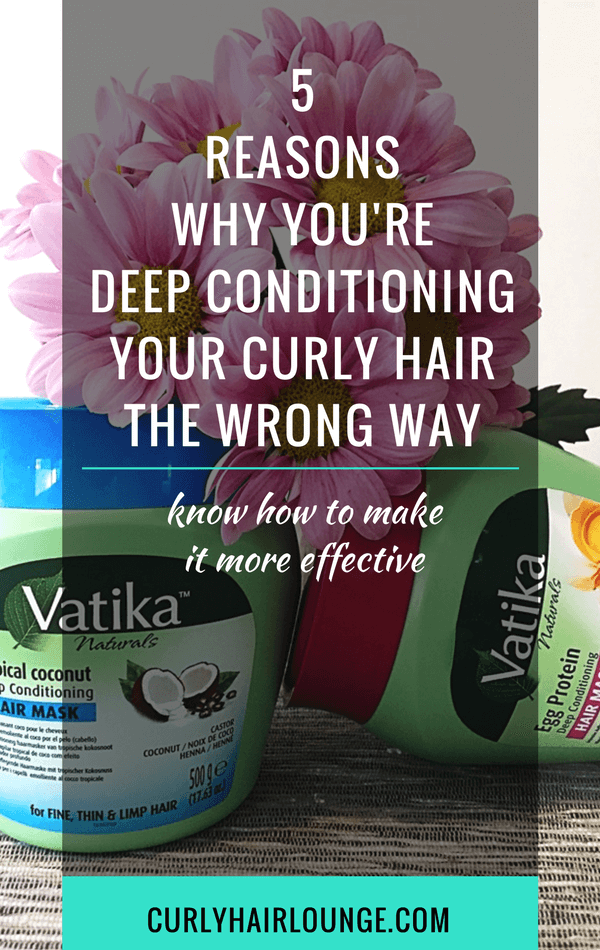

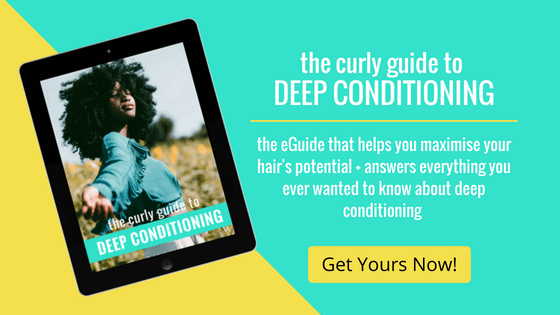
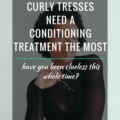
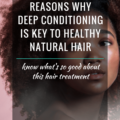

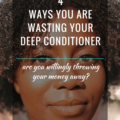
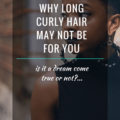
2 thoughts on “5 Reasons Why You’re Deep Conditioning Your Curly Hair The Wrong Way”
Hello Monica. When I deep condition, I detangle so that it’s thoroughly distributed. But when I do I’m pulling out so much hair. If I use a conditioner with silicones first (for the sake of slip) will the coating it forms prevent all the goodness of my deep conditioner from penetrating my hair strands? And I am using a seamless big tooth comb, by the way.
Hi Lina, what I would ask you is what deep conditioner are you using? What ingredients does it have? Generally, I find that people are using poorly formulated conditioners that are too heavy on butter and oils and have little to no conditioning ingredients like fatty acids and Behentrimonium Methosulphate. I would also look to see if you’re not adding too much protein to hair routine, this can make your hair feel stiff, hard to manage and lead to hair breakage.